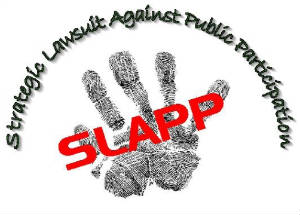
It was five years ago that I wrote an op-ed for the New York Law Journal, begging the Legislature to pass anti-SLAPP legislation. And now, both the New York Assembly and Senate did just that.
To quickly review what a SLAPP suit (strategic lawsuit against public participation) is, it’s a meritless lawsuit designed to shut someone up by foisting litigation upon them. This is generally done with frivolous defamation claims.
When such suits are newsworthy, it’s usually because someone high profile like Donald Trump is involved, even when he doesn’t have a leg to stand on. One example (and there are many) is the $500M suit he brought against Univision’s President for comparing him to homicidal racist Dylan Roof, which had been presented as a clear opinion.
Or losing a suit he brought against Tim O’Brien for questioning his wealth and calling him a mere millionaire. After losing, Trump actually confessed that it was frivolous, saying in an interview:
“I spent a couple of bucks on legal fees, and they spent a whole lot more. I did it to make his life miserable, which I’m happy about.”
But that’s the high-profile stuff. Most you won’t hear about, either because the people are not Page Sixers or because the threat was successful. You don’t really read about the butcher, baker or candlestick maker being threatened for bad Yelp or Trip Advisor reviews. But it happens.
I’ve been down that road twice with this blog, once being sued by Joseph Rakofsky when he sued the internet. And a second time by orthopedist Michael Katz after I reported that a judge repeatedly calling him a liar from the bench when he appeared as an expert.
Both times the suits were shot down by judges in the pleadings stages, but New York’s lower courts seem to have a great reluctance to sanction such stupidity, which would have gone a long way toward helping cut down these kinds of actions.
With that history out of the way…
Now the Legislature has, at long last, acted. Previously it was only the Democratically controlled Assembly passing bills, with the Senate (in Republican hands or very closely divided for many years) failing to follow. I never figured out why that reluctance was there since free speech is a bipartisan issue.
With the leadership now of Senate Majority Leader Andrea Stewart-Cousins and Assembly Leader Carl Heastie a bill has been passed. This came with the efforts of Assembly sponsor Helene Weinstein and Senate sponsor Brad Hoylman.
First, it requires legal fees to be paid if the suit is frivolous. And frivolous is defined the same way it is in New York’s court rules, except now it will be statutory: It will be deemed frivolous if “the action involving public petition and participation was commenced or continued without substantial basis in fact and law and could not be supported by a substantial argument for the extension, modification or reversal of existing law.”
What is public petition and participation? The definition is quite broad. It fills that requirement if it’s regarding “(1) any communication in a place open to the public or a public forum in connection with an issue of public interest; or (2) any other lawful conduct in furtherance of the exercise of the constitutional right of free speech in connection with an issue of public interest, or in furtherance of the exercise of the constitutional right of petition.”
This should cover not only the high-profile crap from celebrities threatening to rain a shitstorm of lawyers down on your head if you don’t take down that post calling them weenies, but also the humble restaurant review that was less than generous.
What is a claim? Not a threat, apparently, but it “includes any lawsuit, cause of action, cross-claim, counterclaim, or other judicial pleading or filing requesting relief.”
And what is “public interest? Glad you asked: “Public interest shall be construed broadly, and shall mean any subject other than a purely private matter,” by showing that “the cause of action has a substantial basis in law or is supported by a substantial argument for an extension, modification or reversal of existing law.”
And it gets heard quickly (by New York standards), as, “The court shall grant preference in the hearing of such motion.”
Finally on the bill, the matter is stayed pending the resolution of the motion. The court can, if it so chooses, order “specified” and “limited” discovery if the plaintiff asserts certain specific discovery is needed to show the motion isn’t frivolous.
Governor Cuomo should sign this bill. There is no colorable reason to protect frivolous suits that are designed to quash the First Amendment rights of the citizenry.
Is there a bug lurking somewhere that might throw a wrench into all this? Yeah.
There’s an open question as to whether federal courts will apply state anti-SLAPP laws. Many other states already have them.
The federal Courts of Appeals are split on this issue and one day it may come before the Supremes. Just recently, in a matter involving television personality Joy Reid, the Second Circuit said state laws did not apply. But the Ninth Circuit says they do.
Congress, of course, can resolve this problem with a federal anti-SLAPP statute. The only ones who would oppose it would be vexatious litigants.
In the meantime, you should expect New York litigants stretching for any kind of federal angle to get into federal court and avoid New York’s new anti-SLAPP legislation. Assuming, of course, that Gov. Cuomo signs it.
Elsewhere:
- The Legal System Should Not Be a Tool for Bullies (New York Times editorial)
- New York Legislature Passes Bill to Protect Free Speech From Frivolous Lawsuits (Hollywood Reporter)
- About Time: New York Finally Passes Anti-SLAPP Bill (Mike Masnick, at Techdirt)
- The Privilege to Speak One’s Mind: New York Broadens Its Anti-SLAPP Statute (JD Supra)